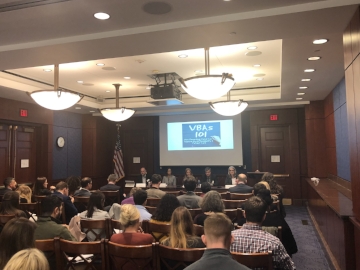CAHC ANALYSIS SHOWS ANTI-KICKBACK, MEDICAID “BEST PRICE” CHANGES TO EXPAND VBAS COULD SAVE $36 BILLION ANNUALLY IN TOTAL HEALTHCARE COSTS

WASHINGTON, DC (October 19, 2018): The Council for Affordable Health Coverage (CAHC) – a coalition of employers, insurers, life science companies, PBMs, brokers, agents, patient groups, and physician organizations – convened Congressional staffers and industry leaders this week for a briefing entitled “VBAs 101: How Rewarding Value Can Improve Rx Affordability & Patient Care.”
The October 18th briefing, featuring remarks from the National Patient Advocate Foundation, the Alliance for Patient Access, CVS Health, AstraZeneca US, and CAHC staff discussed the potential of value-based arrangements (VBAs) between manufacturers and payors to improve prescription drug affordability, as well as current impediments to VBAs that exist today in federal health programs. The event comes as CAHC is working with its champions in the U.S. Senate toward introduction of a VBA bill in the coming weeks.
CAHC members have specifically championed a safe-harbor for VBAs under the Anti-Kickback Statute, as well as an exemption for such arrangements under the Medicaid “best price” rule. A forthcoming analysis from CAHC Chief Economist and Congressional Budget Office alumnus Jeff Lemieux shows that such policy changes could save $36 billion annually in total healthcare costs – stemming largely from reduced hospital and physician costs due to improved patient outcomes – while offering federal budgetary savings of $2.8 billion over the ten-year budget window.
CAHC first brought together a diverse cross-section of industry stakeholders to address roadblocks to VBAs in federal health programs with its widely-circulated May 2017 whitepaper entitled, “Prescriptions for Competition, Value, and Innovation: Positive Reforms to Increase Access and Affordability for Prescription Drugs.” Since then, the coalition has championed solutions to expand VBAs in op-eds, social media, Congressional briefings, and individual meetings with policymakers.
At this week’s briefing, Odalys Caprisecca, Executive Director of Strategic Pricing and Operations for AstraZeneca US, explained how “Value-based arrangements offer the potential to improve outcomes, increase efficiencies, and reduce overall healthcare costs” while Don Dempsey, Vice President for Policy and Regulatory Affairs for CVS Health, touted the ability of VBAs to improve care coordination and medication adherence. Dempsey called this the “forgotten part” of today’s national discussion on value-based care.
Nicole Braccio, Policy Director for the National Patient Advocate Foundation, remarked that expanded use of VBAs can “pave the way for person-centered care.” Similarly, Susan Hepworth with the Alliance for Patient Access called such payment models “a good way to ensure less breakdown” of the physician-patient relationship.
CAHC President Joel White, who moderated the briefing, wrote this week inRealClearHealth about hindrances to value-based contracting specifically in Medicare Part D – a law he helped write as former professional staff for the House Ways and Means Committee.